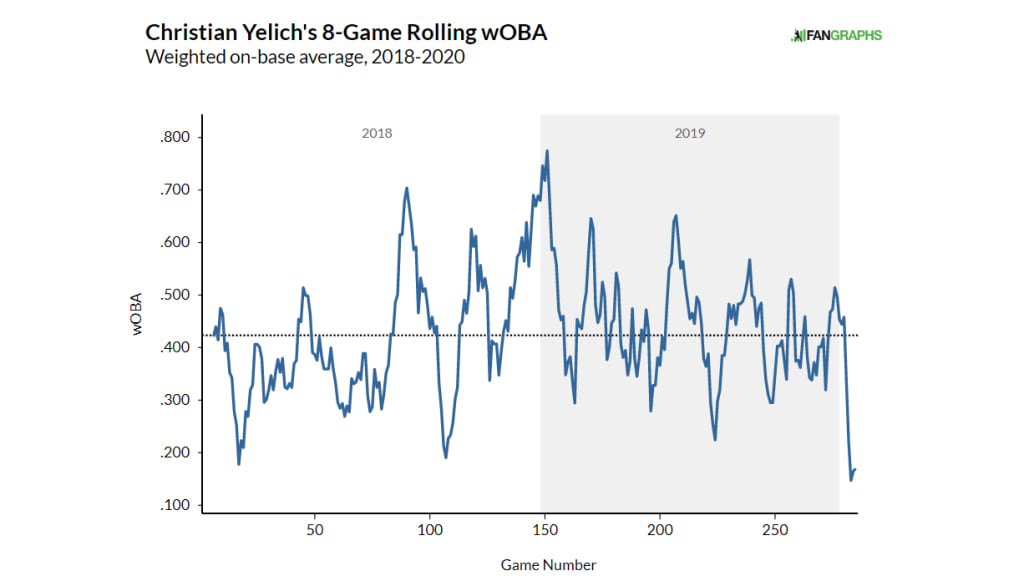Christian Yelich knew this was a possibility. Speaking about the unique challenges of a shortened 2020 season when the Brewers gathered for Summer Camp a month ago, he made a prediction.
“You’re going to see really good players have really bad years,” Yelich said, via MLB.com Brewers reporter Adam McCalvy. “It’s going to happen. Not only position-player-wise, but pitcher-wise. You don’t have that large sample size for everything to even out, so if you get off to a tough start or a bad start, you’re really behind the 8-ball.”
With every game carrying 2.7 times the weight in a 60-game season, a slow start is magnified. And that’s now the exact situation in which Yelich finds himself.
Through his first eight games, Yelich is just 3-for-34, and his wRC+ of 3 was the sixth-lowest among 177 MLB hitters with at least 30 plate appearances through Tuesday. On Wednesday, the 2018 National League MVP Award winner did not play in the Brewers’ 1-0 win over the White Sox, getting a “mental break,” from manager Craig Counsell.
He should be back in there on Thursday night in Chicago, but in the meantime, is it worth being concerned? After all, we’re talking about all of eight games from a player who was the second-best hitter in the sport behind Mike Trout over his first two seasons in Milwaukee.
Here’s the good news and the bad news.
The good: This slump is not unprecedented
It is more noticeable. That’s what happens when it comes at the beginning of a short season.
But even if you limit the scope to Yelich’s time in Milwaukee, you can find a couple of comparable stretches. They’re apparent in this chart, via FanGraphs.

Here are the numbers, including weighted on-base average (wOBA), a metric that is on the scale of on-base percentage and accounts for extra bases. For context, Yelich’s overall wOBA in 2018 was .422, fourth highest among qualifiers.
April 21-29, 2018: 8 games, 34 PA, .178 wOBA (.129/.176/.226)
Aug. 7-15, 2018: 8 games, 39 PA, .191 wOBA (.111/.205/.200)
July 24-Aug. 4, 2020: 8 games, 37 PA, .165 wOBA (.088/.162/.206)
Needless to say, Yelich was just fine after those first two brief slumps. After that second one, in mid-August 2018, all he did was slash .373/.481/.833 with 18 home runs and 50 RBIs over his final 40 games, posting an absurd .534 wOBA and pulling away in the NL MVP race, in which he ultimately took 29 of 30 first-place votes.
He went on to defy predictions of regression by improving his numbers in 2019, before signing a huge contract extension. (Though again, that campaign was not without the occasional scuffle, including an eight-game stretch from June 22-30 in which Yelich posted a .224 wOBA.)
And it’s not as if those previous mini-slides were any less “real” than this current one. We can attempt to measure that by looking at expected wOBA (xwOBA), which goes a step further by accounting for a hitter’s quality of contact (instead of his batted-ball results), along with his strikeouts and walks.
Yelich’s lowest xwOBA over any 8-game stretch
From 2018-present with Brewers
1-T) .276 (July 24-Aug. 4, 2020)
1-T) .276 (Aug. 5-14, 2018)
3) .278 (Aug. 7-15, 2018)
4) .286 (May 9-16, 2018)
5) .295 (July 6-13, 2018)
Two things jump out here. First, that .276 xwOBA in 2020 is quite a bit higher than Yelich’s .178 wOBA, suggesting that there has been some bad luck. Take the 98.5 mph line drive up the middle -- with a .713 expected batting average -- that was snared by a diving Kris Bryant on July 25.
Second, Yelich has been through an eight-game slide exactly as ineffective as his current one, even in his two spectacular seasons with the Brew Crew. From Aug. 5-14, 2018, he struck out in one-third of his trips to the plate and only squared up a few batted balls.
If Yelich could brush off such a skid before, it stands to reason he can do it again now.
The bad: K’s are concerning
Yelich may be a bit unlucky this season, but he’s not that unlucky. That .276 xwOBA still ranked only 145th of those 177 hitters (minimum 30 appearances) through Tuesday, a jarring situation for an All-Star with MLB’s second-best xwOBA (.433) over the previous two seasons.
There are no especially promising indicators lurking below the surface. Yelich hard-hit rate is way down, he’s traded a bunch of fly balls for grounders, and he hasn’t hit a single ball the opposite way.
But the most worrisome thing is that Yelich isn’t putting the ball in play much at all.
In 2018 and ‘19, Yelich struck out in between 20-21% of his plate appearances, less than the MLB average (22-23%). His ability to make elite contact while limiting K’s was a big part of his ascent to superstardom. In 2020, however, Yelich has struck out in 16 of his 37 plate appearances -- more than once in six of his eight games, including three times on Tuesday.
Yelich’s highest K% over any 8-game stretch
From 2018-present with Brewers
1) 43.2% (July 24-Aug. 4, 2020)
2) 37.1% (June 16-24, 2018)
3) 36.4% (Aug. 2-16, 2019)
4) 34.3% (May 9-16, 2018)
5 stretches tied at 33.3%
So now we have something that is unprecedented for Yelich’s Brewers career, if not dramatically so. And a difficulty putting the ball in play could suggest deeper problems than hitting into a bunch of outs.
Yelich is swinging and missing more, and what is most interesting is that it’s not because he’s swinging wildly. In fact, his modest 19.3% chase rate on out-of-zone pitches is down from the past two seasons. No, the real issue is that Yelich is missing pitches within the strike zone.
Yelich’s whiff rate on in-zone swings
2018: 14.0%
2019: 16.1%
2020: 34.8%
Nearly all of those pitches have been breaking balls or offspeed pitches in the lower third of the zone. Uncharacteristically, they seem to be catching Yelich off-balance -- out in front, swinging over the top, and often staggering.
Yelich and the Brewers have not gone into great detail about what they think is behind this early slump. But Counsell suggested Tuesday that it could be a combination of mental fatigue as well as “mechanical things that we see and he feels, but he’s having a hard time fixing …”
Hopefully, Yelich really is fully healthy, and if so, the chances seem good that he will revert to form, as he has done in the past. Eight games should not be enough to cause panic, and Yelich could easily make all this worrying seem silly in the next day or two. But the possibility that he is struggling to correct a mechanical flaw that is keeping him from hitting pitches he normally would is a troubling one.
If Yelich can’t snap out of this skid relatively soon, the season will get late awfully early -- as he well knows.
